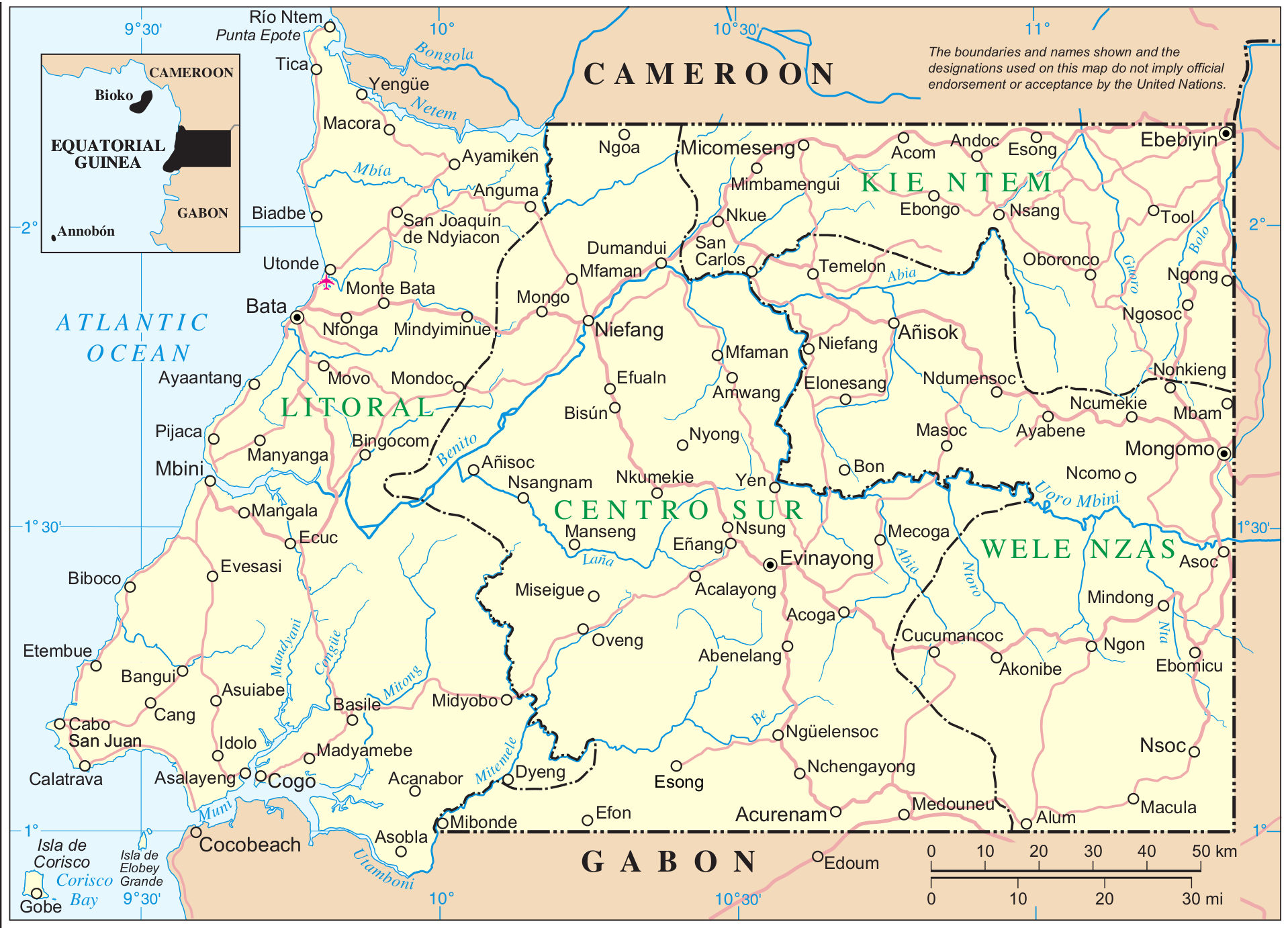Río Muni on:
[Wikipedia]
[Google]
[Amazon]
 Río Muni (called ''Mbini'' in
Río Muni (called ''Mbini'' in
Fang
A fang is a long, pointed tooth. In mammals, a fang is a modified maxillary tooth, used for biting and tearing flesh. In snakes, it is a specialized tooth that is associated with a venom gland (see snake venom). Spiders also have external fangs, ...
) is the Continental Region (called ''Región Continental'' in Spanish
Spanish might refer to:
* Items from or related to Spain:
**Spaniards are a nation and ethnic group indigenous to Spain
**Spanish language, spoken in Spain and many countries in the Americas
**Spanish cuisine
**Spanish history
**Spanish culture
...
) of Equatorial Guinea
Equatorial Guinea, officially the Republic of Equatorial Guinea, is a country on the west coast of Central Africa. It has an area of . Formerly the colony of Spanish Guinea, its post-independence name refers to its location both near the Equ ...
, and comprises the mainland geographical region, covering . The name is derived from the Muni River, along which the early Europeans had built the Muni River Settlements.
Río Muni is bordered to the north by Cameroon
Cameroon, officially the Republic of Cameroon, is a country in Central Africa. It shares boundaries with Nigeria to the west and north, Chad to the northeast, the Central African Republic to the east, and Equatorial Guinea, Gabon, and the R ...
, to the east and south by Gabon
Gabon ( ; ), officially the Gabonese Republic (), is a country on the Atlantic coast of Central Africa, on the equator, bordered by Equatorial Guinea to the northwest, Cameroon to the north, the Republic of the Congo to the east and south, and ...
and to the west by the Gulf of Guinea
The Gulf of Guinea (French language, French: ''Golfe de Guinée''; Spanish language, Spanish: ''Golfo de Guinea''; Portuguese language, Portuguese: ''Golfo da Guiné'') is the northeasternmost part of the tropical Atlantic Ocean from Cape Lopez i ...
.
History
Río Muni was ceded byPortugal
Portugal, officially the Portuguese Republic, is a country on the Iberian Peninsula in Southwestern Europe. Featuring Cabo da Roca, the westernmost point in continental Europe, Portugal borders Spain to its north and east, with which it share ...
to Spain
Spain, or the Kingdom of Spain, is a country in Southern Europe, Southern and Western Europe with territories in North Africa. Featuring the Punta de Tarifa, southernmost point of continental Europe, it is the largest country in Southern Eur ...
in 1778 in the Treaty of El Pardo. The Spanish had hoped to collect slaves to work in their other overseas possessions, but the settlers died of yellow fever, and the area was deserted. Cocoa and timber became major industries upon recolonization. Río Muni, along with Bioko
Bioko (; ; ; historically known as Fernando Pó, ) is an island of Equatorial Guinea. It is located south of the coast of Cameroon, and northwest of the northernmost part of mainland Equatorial Guinea. Malabo, on the north coast of the is ...
, became a province of Spanish Guinea
Spanish Guinea () was a set of Insular Region (Equatorial Guinea), insular and Río Muni, continental territories controlled by Spain from 1778 in the Gulf of Guinea and on the Bight of Bonny, in Central Africa. It gained independence in 1968 a ...
in 1959.
Population
In 2015, 885,015 people—about 72% of Equatorial Guinea's population—lived in Río Muni. The main languages spoken in Río Muni areFang
A fang is a long, pointed tooth. In mammals, a fang is a modified maxillary tooth, used for biting and tearing flesh. In snakes, it is a specialized tooth that is associated with a venom gland (see snake venom). Spiders also have external fangs, ...
-Ntumu, which is spoken in the north, and Fang-Okak, spoken in the south. Spanish
Spanish might refer to:
* Items from or related to Spain:
**Spaniards are a nation and ethnic group indigenous to Spain
**Spanish language, spoken in Spain and many countries in the Americas
**Spanish cuisine
**Spanish history
**Spanish culture
...
is also spoken, although only as a second language.
Provinces
Río Muni comprises fiveprovinces
A province is an administrative division within a country or state. The term derives from the ancient Roman , which was the major territorial and administrative unit of the Roman Empire's territorial possessions outside Italy. The term ''provi ...
:
:* Centro Sur
:* Djibloho
:* Kié-Ntem
:*Litoral
The littoral zone, also called litoral or nearshore, is the part of a sea, lake, or river that is close to the shore. In coastal ecology, the littoral zone includes the intertidal zone extending from the high water mark (which is rarely inu ...
:* Wele-Nzas
Cities
The largest city is Bata, which also serves as the regional administrative capital. Other major towns include Evinayong, Ebebiyín, Acalayong, Acurenam,Mongomo
Mongomo is a town in the province of Wele-Nzas on mainland Equatorial Guinea, on the eastern border, roughly 1 km (0.62 mi) west of Gabon's Woleu-Ntem Province.
The president of Equatorial Guinea, Teodoro Obiang Nguema Mbasogo, was bor ...
and Mbini
Mbini is a town in Río Muni, Equatorial Guinea, lying at the mouth of the Benito River. ''Mbini'' is the Ndowe language, Ndowe name for Río Muni. It is located 44 km southwest of Bata, Equatorial Guinea, Bata.
In 1994, the population was ...
.
See also
* Elobey, Annobón and Corisco * Popular Idea of Equatorial Guinea * Postage stamps and postal history of Equatorial GuineaReferences
* {{DEFAULTSORT:Rio Muni Regions of Equatorial Guinea Former Spanish colonies Geography of Equatorial Guinea Enclaves and exclaves Metropolitan or continental parts of states